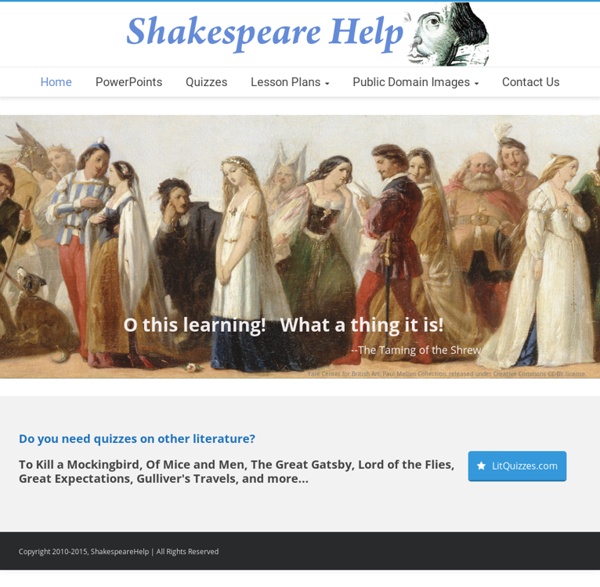



Open Source Shakespeare: search Shakespeare's works, read the texts ENGL 339 Home Page English 339: Introduction to ShakespeareFall, 2013 Site Navigation PREREQUISITES: GE area A (esp. expository writing, e.g. ENGL 134, and reasoning, argumentation and writing, e.g. ENGL 145); AND GE area C1 (a 200-level literature class, e.g. A WRITING-INTENSIVE, G.E. GWR: As a C4 literature class, ENGL 339 may be taken by students wishing to fulfill the Graduate Writing Requirement (GWR). ENGL 339 is designed to introduce both English or Theatre majors and G.E. students to representative plays of all genres by William Shakespeare, perhaps the finest poet ever to write in English. REQUIRED TEXTS: The SIGNET CLASSICS editions of A Midsummer Night's Dream; Henry V; Macbeth; Hamlet; and The Tempest. NOTE: As You Like It has been dropped from the class this quarter due to the necessity of scheduling a video screening of a film available only on VHS during class time. VIDEO SCREENINGS / PERFORMANCES: Shakespeare's plays were written to be performed -- they were originally seen, not read.
Essential knowledge and literary terms for understanding Shakespeare. An Award winning You - you- your- your formal and distant form of address suggesting respect for a superior or courtesy to a social equal. Thou - thee - thy - thine informal and close form and can imply either closeness or contempt. Gertrude: Hamlet, thou hast thy father much offended. "Ye/you" or "thou/thee" sometimes show social classes, too. Falstaff: Dost thou hear, hostess? It can be insulting if it was used by an inferior to address a superior social rank.
Shakespeare Navigators Absolute Shakespeare - plays, quotes, summaries, essays... Enjoying "Macbeth" by William Shakespeare Enjoying "Macbeth", by William Shakespeare by Ed Friedlander, M.D.erf@kcumb.edu This Is NOT "Family Entertainment." Young people who know of Shakespeare from "Shakespeare Gardens" and "Beautiful Tales for Children" may be surprised by what happens in Macbeth. When we first hear of Macbeth, he has just cut an enemy open ("unseamed") from belly button ("nave") to throat ("chops"). The king shouts "Oh valiant cousin! Worthy gentleman!" The Real Macbeth and His Times Shakespeare got his story from Raphael Holinshed's Chronicles. I've read that Holinshed's section on Macbeth was largely derived from the work of one Hector Boece, Scotorum Historiae ("Chronicles of Scotland", 1526-7, translated from Latin into English by a John Bellenden in 1535). It is evidently not online. Here's what we think really happened with Macbeth and the other characters. In a barbaric era, population pressures made war and even the slaughter of one community by another a fact of life. The historical Mrs. Mr. Evil?
Romeo & Juliet Using this Guide List of other study guides The notes were prepared for use with an edition of Romeo and Juliet bound together with the book for West Side Story and in conjunction with a showing of Franco Zeffirelli's film version of the play, but they will be useful with any edition or production. The introduction focuses primarily on comparisons with West Side Story, so it has relatively little to say about the play as such. Although Shakespeare's dialogue often reads beautifully enough on the page, please keep in mind that he never intended his words to be read. Shakespeare wrote almost no original plots. Italian cities were infamous for their long-lasting, deadly feuds between prominent families. Prologue Modern taste prefers not to be told right at the beginning of a play how it will end; but many in Shakespeare's audience already knew the story and were looking to enjoy how well it was told, not seeking to be surprised by original plot turns. Act I: Scene 1 Act I: Scene 2
Romeo: courtly lover Courtly lover and madman Commentary Table of Contents | Next page On this page: Introduction Partly because you will be thoroughly familiar with the main line of the plot of Romeo and Juliet, I am going to start my discussion of the play by beating about the bush: I will ask you to look at Romeo before he meets Juliet; at the brilliant but eccentric speech of Mercutio on Queen Mab; at Romeo and Juliet as tragedy; and at some of the many colourful minor characters in the play--then to look again at Romeo and Juliet themselves. Look with some care at the dialogue between Benvolio and Romeo, 1. 1. lines 163-241. Look especially at the near-comic juxtaposition of ideas in lines 174-8, just before Romeo's first apostrophe to Love. Look ahead to the next scene with Romeo (still before he has met Juliet), 1. 2, particularly lines 91-6 where he speaks again in response to Benvolio. Think of Orlando in the first three acts of As You Like It, even perhaps Claudio in Much Ado About Nothing.
A Midsummer Night's Dream Introduction This study guide is intended for GCE Advanced level students in the UK, but is suitable for university students and the general reader who is interested in Shakespeare's plays. Please use the hyperlinks in the table above to navigate this page. Preparing to study This guide is written to support your study of A Midsummer Night's Dream. If you find this guide too hard, then you should perhaps look at the more elementary guide to this play on this site. Go to basic guide to A Midsummer Night's Dream Back to top What other resources should you use? Editions of the text The most authoritative version is the Arden (University Paperbacks) edition, edited by Harold F. Handbooks for literature Useful handbooks for the general study of English literature include The Cambridge Guide to Literature, The Oxford Guide to Literature, J.A. Use these books effectively: do not try to read them for extended periods like a story (unless you have unusual intellectual powers!) Using the Web Structure